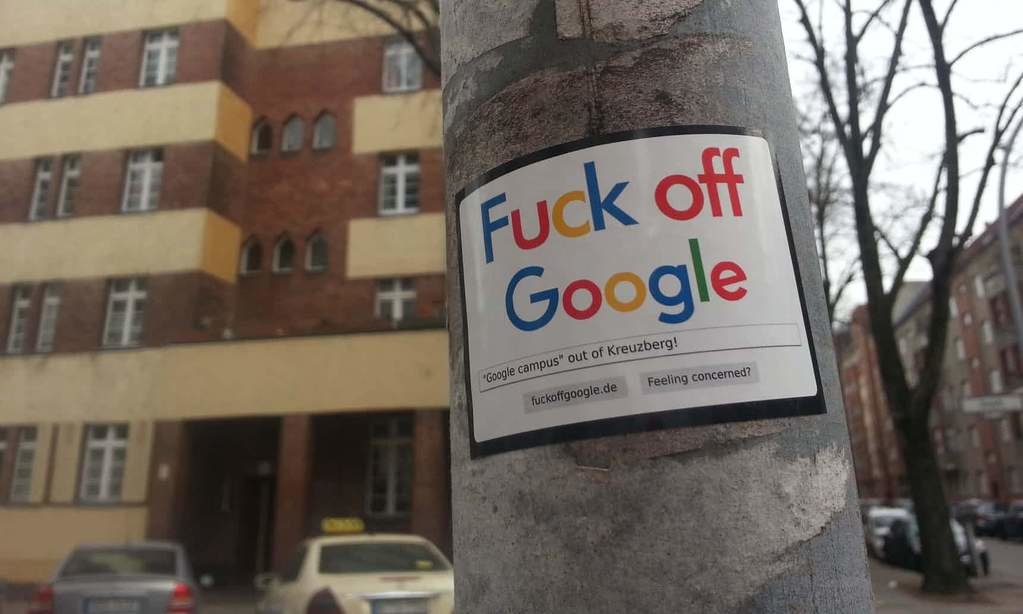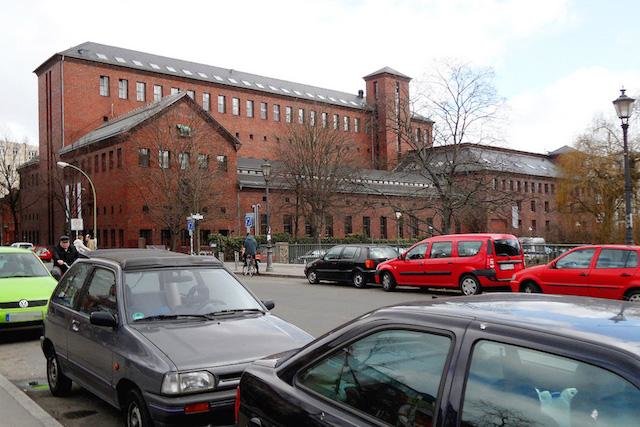
Fuck Off Google.” The sign hangs from an apartment balcony on the Landwehr Canal, a waterway that runs through the unkempt, bohemian district of Kreuzberg and later connects with the Spree. If you walk a little farther, you’ll see another sign, this one hand-painted onto a white piece of canvas and attached to the adjacent building, displaying Google’s multicolored logo with a large, black “X” struck through the lettering. Farther along you’ll see stickers attached to lamp posts and street signs, graffitied sidewalks, errant flyers — all with the same sentiment.
To the casual observer, these signs might be the work of a disgruntled advertiser or former employee of the tech giant, but to local residents of a gritty Berlin neighborhood, they’re a declaration of war.
It’s not a battle cry against tech giants and startups but against rising rents, the erosion of culture, the displacement of locals. It’s a war against gentrification.

The outrage has been simmering for over a year now following the announcement of Google’s plans to open a new campus in the Umspannwerk building in Kreuzberg. The building in question is a former power station, one of many industrial brick buildings that add to the gritty charm of the neighborhood and which is currently being utilized as an exhibition space. It’s not an uncommon use for these industrial remnants, which are also repurposed as art studios, open office spaces, and techno clubs.
It’s the latter that the community generally responds well to, but it’s the former that Google has earmarked the space for — a campus for entrepreneurs and startups, it’s the second such building in the German capital (the first being the affluent and developed district of Mitte).
Tech immigration is nothing new in Berlin. For the past decade, the German capital has been drawing in startups and programmers from all over the world, lured by inexpensive living costs and Berlin’s status as one of the coolest cities in the world. The number of tech startups has soared from 20 or 30 in the mid-2000s to over 2,500 today. Their footprint on the social and economic landscape of Berlin is visible to all, and there are fears that Google’s expansion will dwarf the damage already done.

The fears are justified. Within the last year, rent in Berlin has skyrocketed an incredible 20 percent, an insane figure when you consider that over 85 percent of the city’s population are renters; it’s even crazier when you consider that the average property in 2004 was 120 percent less expensive than present-day prices.
The rising costs are themselves a symptom of the gentrification sweeping the city like a tsunami. Kreuzberg, where Google plans to move its campus, has been hit hardest. In 1970, during Soviet occupation, the neighborhood was one of the poorest quarters in West Berlin. After the wall fell, the district became a counterculture hotspot, providing a home for immigrants, the LGBTQ population, and those who lived on the fringes of society. Today, the vibe is still equally edgy, with the district being home to one of the largest Turkish populations outside of Turkey and drawing in droves of artists and weirdos from around the world. It’s a strangely accessible city and, unlike New York or London, can be enjoyed without having to be filthy rich.
For now.
San Francisco Syndrome
Berlin’s thriving tech scene goes by the cute moniker of Silicon Allee, a nod to the sprawl of startups in the San Francisco Bay area that have come to be the face of technological innovation. The same has also become synonymous with rampant gentrification, skyrocketing property prices, and displaced locals enmasse.
It’s this type of situation that Berlin fears and hopes to avoid. Recent years have seen measures put in place to mitigate the effects of runaway gentrification — rent-control laws that restrict how much rental fees can rise annually, as well as tenant protection, which, short of starting a fire or running a wholesale drug operation from their living room, makes it very difficult to evict a renter once they’ve signed a contract. However, the city is unsure if these measures will be enough to deter the hawkish investor firms that will follow once Google touches base, interested in carving out a slice of startup heaven and syphoning profits that occur as a result of jacking up neighborhood rent.
What are people doing to stop it?
Whereas other cities, such as Warsaw, have welcomed the likes of Google with open arms, keen to enjoy the development, talent, and money that inevitably follows in its wake, Berlin has been less than enthusiastic. In fact, the reaction has been downright loathsome.
The initial opening date of the campus was in autumn of 2017, but anti-gentrification protesters, as well as specialist groups and organizations, set up to delay and possibly deter indefinitely the existential community threat that Google’s campus poses. These groups still meet and discuss what they see as the Google threat. Kalabal!k, a local bookshop, for example, holds regular “anti-Google” meetings twice a month and also distributes a newspaper called “Shitstorm: Against Google, Displacement and Tech Dominance.”
The resistance hasn’t gone completely unnoticed by Google. A spokesman has expressed sympathy with the residents and protesters alike and said they understand the plight of gentrification, particularly in regard to Kreuzberg. But whether this empathy will change their plans for business is a different question.
It remains to be seen whether the numerous websites, organizations, dissident flyers, stickers, signs, and general uproar from the community will be enough to curb Google’s move, and whether Berlin is just the first of many to resist the effects of hosting a large tech corporation. But, at the very least, it should be an obvious indication that they should be more conscious about where their presence is wanted and where it’s not — and what the consequences of relocation can be in the long and short term.

Martin Stokes is a contributing editor for Coffee or Die Magazine. He hails from Johannesburg, South Africa, but currently resides in Germany. He has numerous bylines that cover a variety of topics. He moved to Berlin in 2015 and, while writing for numerous publications, is working assiduously at broadening his repertoire of bad jokes.
BRCC and Bad Moon Print Press team up for an exclusive, limited-edition T-shirt design!
BRCC partners with Team Room Design for an exclusive T-shirt release!
Thirty Seconds Out has partnered with BRCC for an exclusive shirt design invoking the God of Winter.
Lucas O'Hara of Grizzly Forge has teamed up with BRCC for a badass, exclusive Shirt Club T-shirt design featuring his most popular knife and tiomahawk.
Coffee or Die sits down with one of the graphic designers behind Black Rifle Coffee's signature look and vibe.
Biden will award the Medal of Honor to a Vietnam War Army helicopter pilot who risked his life to save a reconnaissance team from almost certain death.
Ever wonder how much Jack Mandaville would f*ck sh*t up if he went back in time? The American Revolution didn't even see him coming.
A nearly 200-year-old West Point time capsule that at first appeared to yield little more than dust contains hidden treasure, the US Military Academy said.












